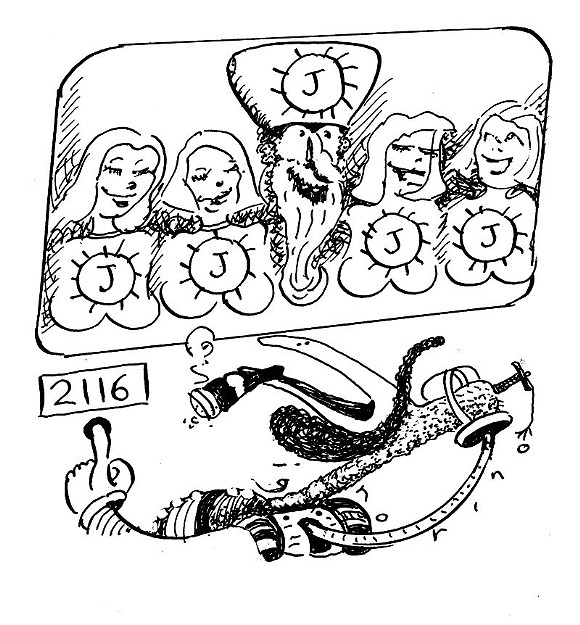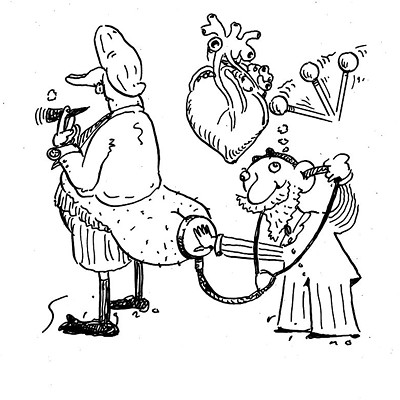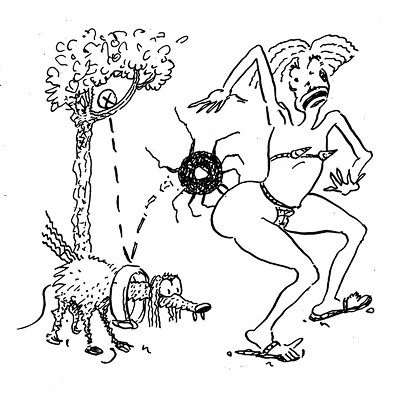In this brave new (Western) world of marriage equality, why is polygamy still illegal? I’ve read the usual arguments, which assume only heterosexual males would want multiple partners; successful men will monopolize all marriageable women, leaving gangs of undesirable bachelors roaming the countryside; etc. They all seem like complete bullshit in the 21st-century U.S. What’s the real reason? —Jason
MAN, the polygamy bandwagon is really picking up steam—no less than Chief Justice John Roberts pitched the idea last year in his dissent in Obergefell v. Hodges, the Supreme Court decision affirming same-sex marriage. Roberts argued, essentially, why stop here?
“From the standpoint of history and tradition,” he wrote, “a leap from opposite-sex marriage to same-sex marriage is much greater than one from a two-person union to plural unions, which have deep roots in some cultures around the world.”
He was being rhetorical, sure—that scamp—but still, a family-law specialist told U.S. News & World Report, the chief might’ve offered polygamy proponents a “legal foothold” for some future test case. From John Roberts’s lips to God’s ears, eh?
Slate called polygamy “the constitutional, feminist, and sex-positive choice.” Politico made your basic due-process argument: How can access to an important social institution be denied to a whole class of people just because they happen to be plural-curious?
As you imply, traditional arguments against polygamous marriage in the U.S. have tended to be shallow and alarmist, as much about ostracizing Mormons (who ban the practice institutionally, though it continues unofficially) as anything else.
Still, they’re rooted in some fact—there are a few documented problems with polygamy as we know it:
• A 2012 study found that, in polygynous cultures, where men take more than one wife, the ensuing sexual competition leads to greater crime and violence. Researchers had been wondering why patriarchal cultures ever transition from polygamy to monogamy at all—it’s not like it’s in the interests of the guys in charge. Their findings led them to surmise that cultures evolve toward monogamy because it provides “greater net benefits for society at large,” even if, in the short term, it means less nooky for male heads of household.
• If multiple spouses attach themselves to high-status individuals, where does that leave the little guy? In 2007 the New York Times reported that hundreds of teenage boys had recently been forced out of a polygamous Mormon community in Utah, apparently to correct a “huge imbalance in the marriage market”—all the brides were being claimed by guys higher up the food chain. You dismiss this dynamic, Jason, but I don’t think it’s a leap to imagine spouses flocking to rich hotties even in the most 21st-century of circumstances.
• Monogamous marriage tends to increase the marryin’ age of young women, who aren’t being competed for so fiercely. In societies that have made the transition to monogamy, it’s generally preceded women’s greater inclusion in the civic sphere.
And there are logistical quibbles. Take marital stability, for instance. Even if people in, say, three-person marriages were no more or less likely to seek divorce than in the two-person kind, divorce rates would still rise by a third. Just imagine the custody battles that might follow if kids are involved. And say I’m an employer offering a great benefits package—do I really need to provide it to all six of your spouses?
Leaving the logistics aside, the overarching claim is that reverting to our pre-monogamy past will bolster the patriarchy where we’ve already made significant strides to weaken it. Of course, the sexist-society argument cuts both ways: arguing against plural marriage on the grounds that it’s traditionally patriarchal ignores the fact that traditional marriage is traditionally patriarchal. Perhaps practitioners of plural marriages can offer creative alternatives to the male-female patriarchal marriage, in the way gay spouses do by definition—maybe via polyandry, the practice of women taking multiple husbands. Historically this is rare and has been poorly studied, but going forward I wouldn’t mind seeing more sisters doing it for themselves. At the very least, advocates argue, legalizing polygamy may make it easier for victims of spousal abuse in preexisting polygamous marriage to find relief.
So I’m with you in spirit, I suppose, but let’s stipulate: the best chance for successful plural marriage is a total upending of the patriarchy and the rewriting of the very well-settled capitalist and legal frameworks on which American society is structured. Call me back in another century and we’ll see how things are going.




























